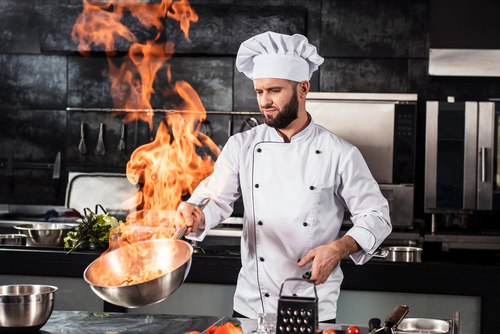
If you have a passion for cooking, then you might want to consider pursuing a degree in culinary arts to prepare for a career as a chef. In past generations, college students considered future salary or job security to be the most important factor in choosing a major. Today’s college students are more likely to make major decisions based on what interests them. That means your peers and instructors in a culinary arts program are likely to share your interest in creating delicious food.
A Culinary Arts Education
In the past, on-the-job training was often enough to prepare candidates to become chefs. Now, though, having a formal education in culinary arts is increasingly popular, the United States Bureau of Labor Statistics (BLS) reports. As more candidates earn a culinary arts degree, not having a formal education could put candidates at a disadvantage. Pursue a culinary arts program can also broaden candidates’ experiences by allowing them to learn new techniques and prepare different kinds of cuisine they might not have the opportunity to work with if all of their training takes place on the job.
Culinary arts programs are found at many different types of learning institutions, from community colleges and technical schools to four-year colleges and universities. There are even some culinary arts schools specifically dedicated to the industry. No matter where you enroll in a culinary arts program, you can expect to spend a good deal of time in kitchens. You’ll work to develop the skills you will need to prepare the highest-quality meals. You’ll will learn to:
- plan menus
- buy and inventory the ingredients a restaurant will need
- handle foods in a safe and sanitary manner
Gaining Hands-On Experience
As valuable as a culinary arts degree is, it is still essential that you get hands-on experience in a restaurant. Many culinary arts programs require that students work in a restaurant kitchen or complete an internship or apprenticeship.
Often, aspiring chefs need to start at entry-level positions, like line cook or assistant cook, and spend years working their way up through the ranks. In these entry-level positions, cooks learn to:
- evaluate the freshness of ingredients
- follow recipes
- keep workspaces and utensils clean and sanitary
- utilize a range of cooking techniques
Aspiring chefs may choose to pursue an apprenticeship in addition to, or instead of, a culinary arts degree program. Apprentices learn many of the same skills as students of formal degree programs over a period of two years. They complete 1,000 hours of instruction and 1,000 hours of work while overseen by an experienced chef.
A love for cooking is a great start for achieving success as a chef. It also takes hard work both in your studies and on-the-job to acquire the skills and experience necessary to become a chef. A culinary arts program can provide you with the instruction you need to accomplish your goals.
Related Resources:
